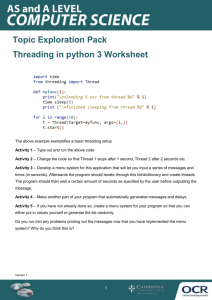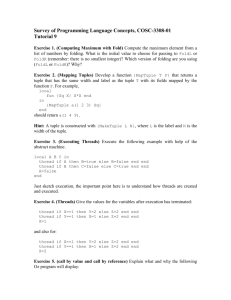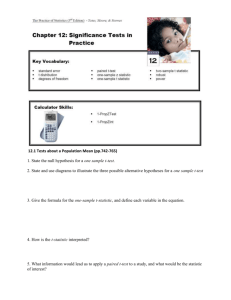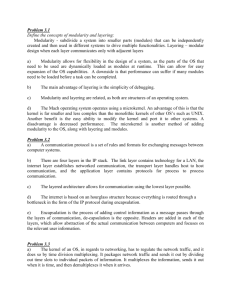Module 5: Threads
advertisement
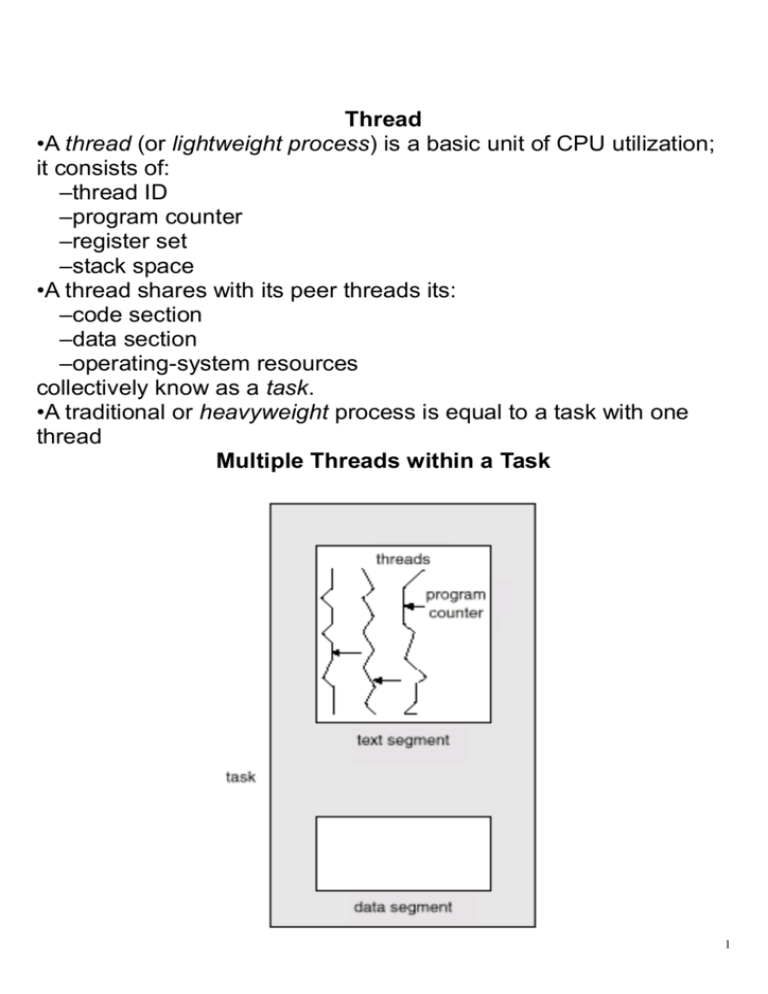
Thread
•A thread (or lightweight process) is a basic unit of CPU utilization;
it consists of:
–thread ID
–program counter
–register set
–stack space
•A thread shares with its peer threads its:
–code section
–data section
–operating-system resources
collectively know as a task.
•A traditional or heavyweight process is equal to a task with one
thread
Multiple Threads within a Task
1
•In a multiple threaded task, while one server thread is blocked and
waiting, a second thread in the same task can run.
–Cooperation of multiple threads in same job confers higher
throughput and improved performance.
–Applications that require sharing a common buffer (i.e.,
producer-consumer) benefit from thread utilization.
•Kernel-supported threads (Mach and OS/2).
•User-level threads; supported above the kernel, via a set of library
calls at the user level (Project Andrew from CMU).
•Hybrid approach implements both user-level and kernel-supported
threads (Solaris 2).
Threads Support in Solaris 2
•Solaris 2 is a version of UNIX with support for threads at the kernel
and user levels, symmetric multiprocessing, and
real-time scheduling.
•LWP – intermediate level between user-level threads and
kernel-level threads.
•Resource needs of thread types:
–Kernel thread: small data structure and a stack; thread
switching does not require changing memory access information –
relatively fast.
–LWP: PCB with register data, accounting and memory
information,; switching between LWPs is relatively slow.
–User-level thread: only ned stack and program counter; no
kernel involvement means fast switching. Kernel only sees the
LWPs that support user-level threads.
2
Module 5: Threads
Benefits
• User and Kernel Threads
• Multithreading Models
• Solaris 2 Threads
• Java Threads
•
Benefits
•
Responsiveness
•
Resource Sharing
•
Economy
•
Utilization of MP Architectures
Single and Multithreaded Processes
User Threads
• Thread Management Done by User-Level Threads Library
•
Examples
- POSIX Pthreads
- Mach C-threads
3
- Solaris threads
Kernel Threads
•
Supported by the Kernel
•
Examples
- Windows 95/98/NT
- Solaris
- Digital UNIX
Multithreading Models
•
Many-to-One
•
One-to-One
•
Many-to-Many
Many-to-One
• Many User-Level Threads Mapped to Single Kernel Thread.
•
Used on Systems That Do Not Support Kernel Threads.
Many-to-one Model
4
One-to-One
• Each User-Level Thread Maps to Kernel Thread.
•
Examples
- Windows 95/98/NT
- OS/2
One-to-one Model
Many-to-many Model
Solaris 2 Threads
5
Solaris Process
Java Threads
• Java Threads May be Created by:
–
–
Extending Thread class
Implementing the Runnable interface
Extending the Thread Class
class Worker1 extends Thread
{
public void run() {
6
System.out.println(“I am a Worker Thread”);
}
}
Creating the Thread
public class First
{
public static void main(String args[]) {
Worker runner = new Worker1();
runner.start();
System.out.println(“I am the main thread”);
}
}
The Runnable Interface
public interface Runnable
{
public abstract void run();
}
Implementing the Runnable Interface
class Worker2 implements Runnable
{
public void run() {
System.out.println(“I am a Worker Thread”);
}
}
Creating the Thread
public class Second
{
public static void main(String args[]) {
Runnable runner = new Worker2();
Thread thrd = new Thread(runner);
7
thrd.start();
System.out.println(“I am the main thread”);
}
}
Java Thread Management
• suspend() – suspends execution of the currently running thread.
sleep() – puts the currently running thread to sleep for a specified
amount of time.
• resume() – resumes execution of a suspended thread.
• stop() – stops execution of a thread.
Java Thread States
•
Producer Consumer Problem
public class Server {
public Server() {
MessageQueue mailBox = new MessageQueue();
Producer producerThread = new Producer(mailBox);
Consumer consumerThread = new Consumer(mailBox);
producerThread.start();
consumerThread.start();
}
public static void main(String args[])
Server server = new Server();
{
8
}
}
Producer Thread
class Producer extends Thread {
public Producer(MessageQueue m) {
mbox = m;
}
public void run() {
while (true) {
// produce an item & enter it into the buffer
Date message = new Date();
mbox.send(message);
}
}
private MessageQueue mbox;
}
Consumer Thread
class Consumer extends Thread {
public Consumer(MessageQueue m) {
mbox = m;
}
public void run() {
9
while (true) {
Date message = (Date)mbox.receive();
if (message != null)
// consume the message
}
}
private MessageQueue mbox;
}
10

